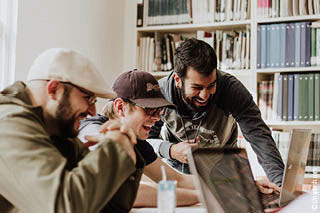The aim of the project "RecoVET - Recognition of Good VET practice for refugees", which will start in March 2022, is to make good practice of projects and measures for the vocational integration of refugees usable. The project is headed by WiSo researchers Matthias Pilz and Junmin Li with colleagues from the University of Bergamo, the University of Innsbruck and the University of Valencia.
"It's the economy, stupid". This phrase coined by Bill Clinton's campaign manager James Carville already served many purposes. However, hardly anyone will doubt that economic or professional prospects for the social integration of refugees are of decisive importance. In this respect, the relevance of vocational education and training for future's society has been further updated by the current migration movements.
The RecoVET project will develop a concept for the external evaluation and recognition of specific quality in refugee integration. The concept of quality recognition is translated into three outcomes. The first is an online training for quality assessors to prepare them for the specific challenges in refugee integration. The second outcome is a complementary manual for quality recognition and literature to accompany the online training. The third outcome is a practice-oriented toolbox to implement evaluation and recognition.
The researchers can build on the results of the GoodVET project. Within the framework of this Erasmus+ project, researchers led by Matthias Pilz and Junmin Li from the Chair of economics and business education of the WiSo faculty had already developed quality indicators for successful vocational training programmes for refugees and made them available to stakeholders in an online-based analysis tool.
The researchers can build on the results of the GoodVET project. As part of the Erasmus+ project, a team led by Matthias Pilz and Junmin Li from the Chair of economics and business education of the Faculty of Management, Economics and Social Sciences of the University of Cologne had already developed quality indicators for successful VET programmes for refugees and had made them available to stakeholders in an online-based analysis tool.
The co-financing by the Erasmus+ programme of the European Union for the project period 2022 to 2024 amounts to more than 350,000 €.
